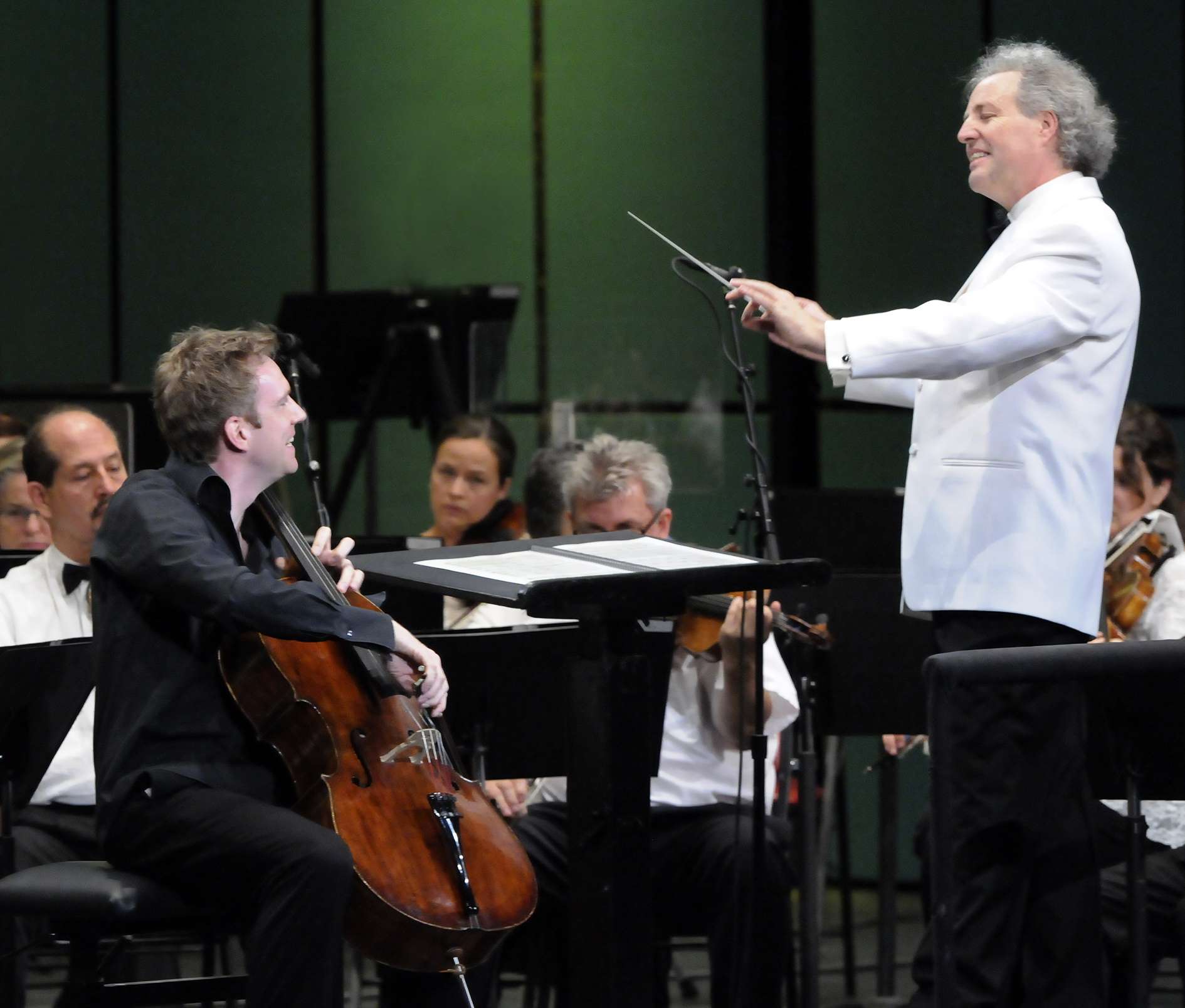|
Back
Has the Pittsburgh Symphony Become Second-Rate? Montreal
Joliette (Amphithéâtre Fernand-Lindsay)
07/21/2012 - & July 24, 2012 (Philadelphia)
Mikhail Ivanovitch Glinka: Overture to Ruslan and Lyudmila
Antonin Dvorák: Cello Concerto in B minor, opus 104
Peter Ilyich Tchaikovsky: Symphony No. 5 in E minor, opus 64
Johannes Moser (Cello)
Pittsburgh Symphony Orchestra, Manfred Honeck (Conductor)

J. Moser, M. Honeck (© C. Alonso/Festival de Lanaudičre)
I first heard the Pittsburgh Symphony Orchestra in performance about 30 years ago. I left that concert with the impression that it was the “orchestra of steel—” sharp, edgy—a fitting reflection of its home city. Two summers ago, in concerts at the Festival de Lanaudičre, the orchestra still impressed with its tight, well-honed sonorities. At Saturday evening’s concert, however, it came across as second-rate.
The evening began on a promising note with Glinka’s Overture to Ruslan and Lyudmila. It was sprightly paced and bristled with energy. The strings stood out with a lush, unified sound. The “steely” aspect was in full evidence from the brass and the woodwinds.
Nevertheless, problems were evident right from the beginning of Dvorák’s Cello Concerto. The first sounds we heard from the brass were raw, ragged and too loud. The second theme presented by the solo horn was played too softly and therefore sounded limp and without direction. The orchestra ricocheted between these extremes of pianississimo and fortississimo for the remainder of the evening.
The soloist, German-Canadian cellist Johannes Moser, played with sweet lyricism and superb technique, but showed little colour, passion and depth. Notes were deprived of their individuality—they just ran into each other in a blur. Even the 1694 Guarneri cello didn’t help. From where I was sitting at the far side of the orchestra seats it sounded thin and tinny. And despite his herculean attempts to provide vibrato, the sound had little resonance. At 43-minutes it was on the slow side. Particularly excruciating was Moser’s playing from the quasi cadenza to the end of the second movement. It was so slow that it broke the tension of the musical line. Moser throughout appeared to be “milking” the audience with his facial distortions, gritting of teeth and grand flourishes with his body and bow. It was if he had just conquered Mt Everest after each of his passages. (Moser’s biography mentions that he recently crossed the Alps on this mountain bike—perhaps he should stick to the Alps and leave the Himalayas to others!) The orchestral accompaniment was lumbering and coarse: brass were strident, overbearing and showed poor phrasing. The coda to the second movement was dull and insipid. Despite these issues, the crowd erupted in wild applause at the end of the performance.
About the only felicitous point in Tchaikovsky’s Fifth Symphony was the rhythmic, pulsing third-movement waltz. The rest of the symphony was basically noise—as with the Dvorák, little passion and no depth. The famous horn solo in the second movement lacked colour and musical line and was interrupted by a low-flying plane (which passed several more times before the symphony’s conclusion.) There were sensitive, well-spun solos from the principal clarinet, bassoon and flute, and especially from oboist Cynthia Koledo DeAlmeida, but the overall architecture uniting the symphony was missing.
Why was the orchestra in such bad shape? Did the musicians feel they were on holiday in the sticks of the Canadian wilderness and didn’t need to bother putting their best foot forward? It didn’t seem to be Music Director Manfred Honeck’s fault. He appeared to be working harder than anyone.
The orchestra presented two encores. Flutist Lorna McGhee gave a lyrical turn in an orchestral extract from Bizet’s Carmen, and the orchestra had a bang-up time with Khachaturian’s Galop. The mostly francophone audience especially enjoyed the injection of the theme from “Alouette, gentille alouette”.
Earl Arthur Love
|